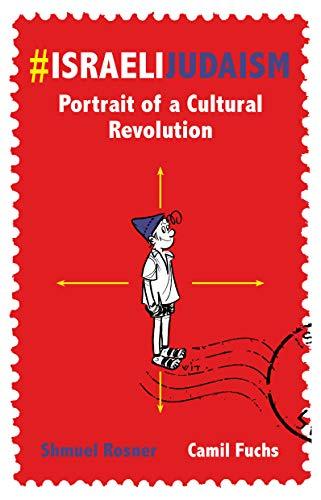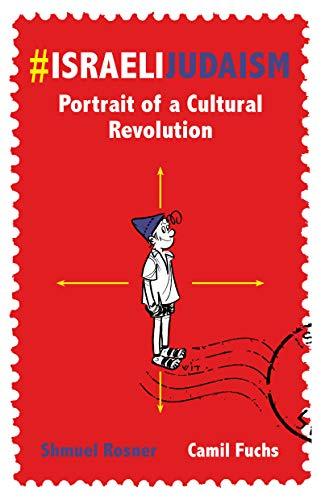Book Review: #IsraeliJudaism: Portrait of a Cultural Revolution, by Shmuel Rosner and Camil Fuchs
I myself have noticed and written about a phenomenon I have called the Israelification of the Haredi community, as more and more Haredim of the younger generation see themselves as Israelis, are patriotic in some sense, speak overwhelmingly Hebrew nowadays instead of Yiddish (even among the Hassidic communities), travel the country, watch Israeli soccer (aka football) tournaments, root for Israelis in international competitions in sports, sciences and whatnot, get upset about BDS, and more.
 There are aspects about this that I have never understood, as some things are almost self-contradictory. For example, on the one hand the country seems to be getting more religious, on the other hand there is more public chilul shabbos than ever before. I just watched it as the phenomenon of a young country growing and developing and the various sectors and sub-communities within are adjusting as the years and generations go by.
There are aspects about this that I have never understood, as some things are almost self-contradictory. For example, on the one hand the country seems to be getting more religious, on the other hand there is more public chilul shabbos than ever before. I just watched it as the phenomenon of a young country growing and developing and the various sectors and sub-communities within are adjusting as the years and generations go by.#IsraeliJudaism: Portrait of a Cultural Revolution deals with a lot of what I threw into the description above without thinking too much about it and without analyzing it too deeply. Reading #IsraeliJudaism I felt this book was practically written for me. #IsraeliJudaism looks at and identifies changes in Israeli society and explores a new culture being formed in Israel that combines Judaism and Israelism.
Camil Fuchs is one of Israel's top statisticians. Combine the statistics of Fuchs with the thinking and analysis of Shmuel Rosner, a fellow at The Jewish people Policy Institute, and you are going to pick up and identify new trends and directions in whatever the topic might be.
The premise of #IsraeliJudaism seems to be that life in Israel over the past several decades has developed a new culture that combines aspects of being Israeli and aspects of being Jewish and has forged a new culture out of that combination. The statistics are vast, but they don't overwhelm the reader with their presentation. The most thorough statistical study of Israeli and Jewish culture ever compiled is used to analyze the trends of society and to point to a different culture among the Jews in Israel in Israel than among the Jews of the Diaspora. They call this new Israeli culture IsraeliJudaism. it is sort of the Venn Diagram of where the majority of Israelis feel both Israeli and Jewish. These trends are pointed out and analyzed over several chapters with topics such as Yom Haatzmaut and Yom Hazikaron broached, along with Shabbos observance, Lag B'Omer, fasting on Yom Kippur, riding bikes on Yom Kippur, hosting or participating in a Pesach Seder, and looking at differing trends of importance among different sectors of society, and how they overlap.
The book, #IsraeliJudaism, is far from a book of statistics. As I mentioned, the authors do not overwhelm the reader with numbers and percentages, but they are peppered throughout the book, mostly at the end of chapters, but also interspersed through the text when relevant. More than the statistics is the analysis, as I described above. Along the way though there is a lot of history, Israeli history, presented. Customs of Israeli behavior are not just mentioned and looked at to see how common they are, but the history of how they began and spread is discussed as well. I learned a lot about some of the things we just do in Israel and never before knew why. Just like I like to know and discover how different customs in Judaism began and spread, I enjoyed learning how some Israeli customs began and spread, and was even surprised with some of the discoveries.
A reader interested in the history of Israel, the future of Israel and the Jewish People, and in the cultures of Israel will find the analysis in #IsraeliJudaism compelling and even fascinating.
You can buy #IsraeliJudaism: Portrait of a Cultural Revolution on Amazon
NOTE: I was not paid to review this book. It is an unbiased and objective review. If you have a book with Jewish or Israel related content and would like me to write a review, contact me for details of where to send me a review copy of the book.
-----------------------------------------------------
Reach thousands of readers with your ad by advertising on Life in Israel
------------------------------------------------------
NOTE: I was not paid to review this book. It is an unbiased and objective review. If you have a book with Jewish or Israel related content and would like me to write a review, contact me for details of where to send me a review copy of the book.
Book Review: #IsraeliJudaism: Portrait of a Cultural Revolution, by Shmuel Rosner and Camil Fuchs
I myself have noticed and written about a phenomenon I have called the Israelification of the Haredi community, as more and more Haredim of the younger generation see themselves as Israelis, are patriotic in some sense, speak overwhelmingly Hebrew nowadays instead of Yiddish (even among the Hassidic communities), travel the country, watch Israeli soccer (aka football) tournaments, root for Israelis in international competitions in sports, sciences and whatnot, get upset about BDS, and more.
 There are aspects about this that I have never understood, as some things are almost self-contradictory. For example, on the one hand the country seems to be getting more religious, on the other hand there is more public chilul shabbos than ever before. I just watched it as the phenomenon of a young country growing and developing and the various sectors and sub-communities within are adjusting as the years and generations go by.
There are aspects about this that I have never understood, as some things are almost self-contradictory. For example, on the one hand the country seems to be getting more religious, on the other hand there is more public chilul shabbos than ever before. I just watched it as the phenomenon of a young country growing and developing and the various sectors and sub-communities within are adjusting as the years and generations go by.#IsraeliJudaism: Portrait of a Cultural Revolution deals with a lot of what I threw into the description above without thinking too much about it and without analyzing it too deeply. Reading #IsraeliJudaism I felt this book was practically written for me. #IsraeliJudaism looks at and identifies changes in Israeli society and explores a new culture being formed in Israel that combines Judaism and Israelism.
Camil Fuchs is one of Israel's top statisticians. Combine the statistics of Fuchs with the thinking and analysis of Shmuel Rosner, a fellow at The Jewish people Policy Institute, and you are going to pick up and identify new trends and directions in whatever the topic might be.
The premise of #IsraeliJudaism seems to be that life in Israel over the past several decades has developed a new culture that combines aspects of being Israeli and aspects of being Jewish and has forged a new culture out of that combination. The statistics are vast, but they don't overwhelm the reader with their presentation. The most thorough statistical study of Israeli and Jewish culture ever compiled is used to analyze the trends of society and to point to a different culture among the Jews in Israel in Israel than among the Jews of the Diaspora. They call this new Israeli culture IsraeliJudaism. it is sort of the Venn Diagram of where the majority of Israelis feel both Israeli and Jewish. These trends are pointed out and analyzed over several chapters with topics such as Yom Haatzmaut and Yom Hazikaron broached, along with Shabbos observance, Lag B'Omer, fasting on Yom Kippur, riding bikes on Yom Kippur, hosting or participating in a Pesach Seder, and looking at differing trends of importance among different sectors of society, and how they overlap.
The book, #IsraeliJudaism, is far from a book of statistics. As I mentioned, the authors do not overwhelm the reader with numbers and percentages, but they are peppered throughout the book, mostly at the end of chapters, but also interspersed through the text when relevant. More than the statistics is the analysis, as I described above. Along the way though there is a lot of history, Israeli history, presented. Customs of Israeli behavior are not just mentioned and looked at to see how common they are, but the history of how they began and spread is discussed as well. I learned a lot about some of the things we just do in Israel and never before knew why. Just like I like to know and discover how different customs in Judaism began and spread, I enjoyed learning how some Israeli customs began and spread, and was even surprised with some of the discoveries.
A reader interested in the history of Israel, the future of Israel and the Jewish People, and in the cultures of Israel will find the analysis in #IsraeliJudaism compelling and even fascinating.
You can buy #IsraeliJudaism: Portrait of a Cultural Revolution on Amazon
NOTE: I was not paid to review this book. It is an unbiased and objective review. If you have a book with Jewish or Israel related content and would like me to write a review, contact me for details of where to send me a review copy of the book.
